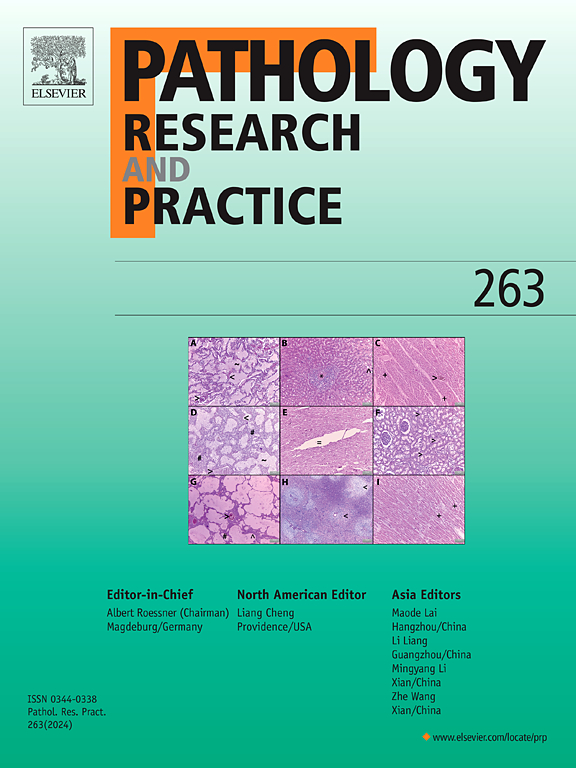Cancer-associated fibroblasts in hypopharyngeal squamous cell carcinoma: Clinical significance, prognostic impact, and correlation with microvessel density
IF 3.2
4区 医学
Q2 PATHOLOGY
引用次数: 0
Abstract
Cancer-associated fibroblasts (CAFs) play pivotal roles in facilitating tumor growth, recurrence, and metastasis. Nevertheless, studies examining the clinicopathological significance of CAFs and microvessel density (MVD) in hypopharyngeal squamous cell carcinoma (HPSCC), as well as their implications for prognosis, are scarce. Tissue samples from 96 HPSCC patients were subjected to immunohistochemistry (IHC) for CAF markers (including FAP and α-SMA) and MVD (characterized by the CD31 marker). Bioinformatics analysis was conducted to elucidate the potential mechanisms through which CAFs exert their functions. Compared with normal hypopharyngeal tissues, HPSCC tissues exhibited a greater number of CAFs and greater MVD. The high-MVD group demonstrated increased levels of FAP and α-SMA expression, increased CAF density, and an elevated rate of lymph node metastasis. Both CAF enrichment and high MVD were significantly associated with adverse clinicopathological features in patients, thereby leading to reduced overall survival. Additionally, both MVD and lymph node metastasis were identified as being independent prognostic factors that markedly increase patient mortality risk. Bioinformatics analyses revealed that CAFs may affect tumor progression, angiogenesis, and metastasis by the PI3K-Akt, KRAS, and Hedgehog signaling pathways, as well as through mechanisms such as epithelial-mesenchymal transition and ECM remodeling. CD19 may act as a potential marker for how CAFs affect the prognosis of head and neck squamous cell carcinomas. In summary, our findings indicate that CAFs and the MVD may significantly influence the prognosis of HPSCC patients. Angiogenesis and immunosuppression may represent the central mechanism through which CAFs affect prognosis, as CAFs facilitate angiogenesis and immunosuppression, thereby driving tumor progression and metastasis.
下咽鳞状细胞癌中癌相关成纤维细胞:临床意义、预后影响及与微血管密度的相关性
癌症相关成纤维细胞(CAFs)在促进肿瘤生长、复发和转移中起着关键作用。然而,关于CAFs和微血管密度(MVD)在下咽鳞状细胞癌(HPSCC)中的临床病理意义及其对预后的影响的研究很少。对96例HPSCC患者的组织样本进行免疫组化(IHC)检测CAF标志物(包括FAP和α-SMA)和MVD(以CD31标志物为特征)。通过生物信息学分析来阐明cac发挥其功能的潜在机制。与正常下咽组织相比,HPSCC组织表现出更多的CAFs和更大的MVD。高mvd组FAP和α-SMA表达水平升高,CAF密度增加,淋巴结转移率升高。CAF富集和高MVD均与患者的不良临床病理特征显著相关,从而导致总生存期降低。此外,MVD和淋巴结转移被认为是显著增加患者死亡风险的独立预后因素。生物信息学分析显示,CAFs可能通过PI3K-Akt、KRAS和Hedgehog信号通路,以及上皮-间质转化和ECM重塑等机制影响肿瘤进展、血管生成和转移。CD19可能作为cas如何影响头颈部鳞状细胞癌预后的潜在标记物。综上所述,我们的研究结果表明,CAFs和MVD可能显著影响HPSCC患者的预后。血管生成和免疫抑制可能是CAFs影响预后的主要机制,因为CAFs促进血管生成和免疫抑制,从而推动肿瘤的进展和转移。
本文章由计算机程序翻译,如有差异,请以英文原文为准。
求助全文
约1分钟内获得全文
求助全文
来源期刊
CiteScore
5.00
自引率
3.60%
发文量
405
审稿时长
24 days
期刊介绍:
Pathology, Research and Practice provides accessible coverage of the most recent developments across the entire field of pathology: Reviews focus on recent progress in pathology, while Comments look at interesting current problems and at hypotheses for future developments in pathology. Original Papers present novel findings on all aspects of general, anatomic and molecular pathology. Rapid Communications inform readers on preliminary findings that may be relevant for further studies and need to be communicated quickly. Teaching Cases look at new aspects or special diagnostic problems of diseases and at case reports relevant for the pathologist''s practice.

 求助内容:
求助内容: 应助结果提醒方式:
应助结果提醒方式:


